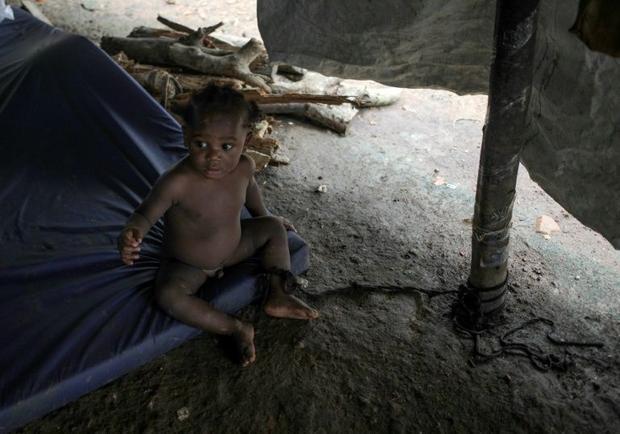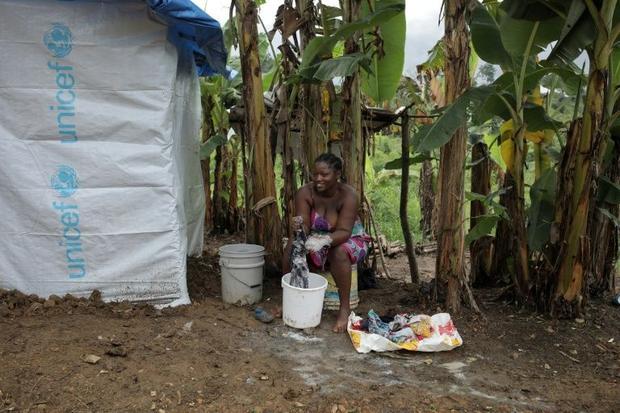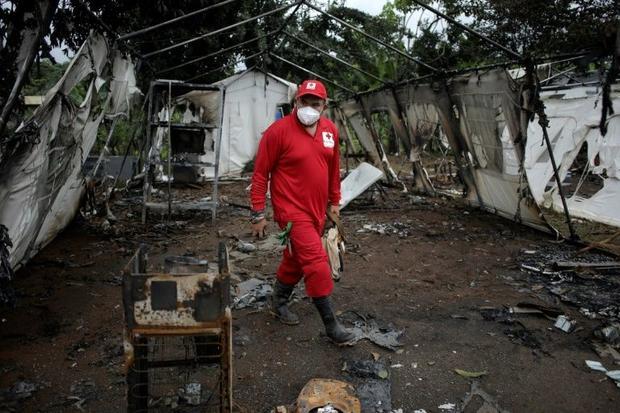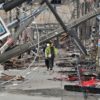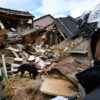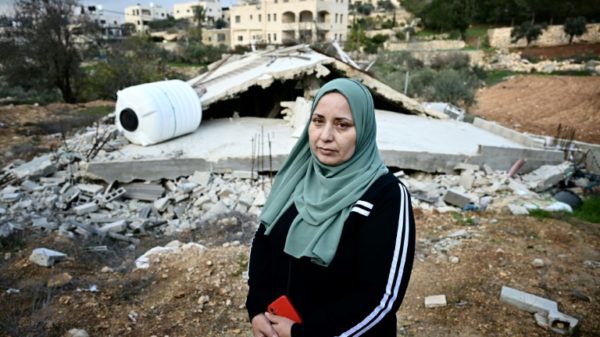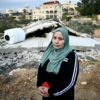Desperation is palpable in La Penita, an indigenous community in the Panamanian jungle province of Darien where 1,500 migrants have been blocked by the coronavirus pandemic from heading towards the United States.
Many of the migrants come from Haiti and Cuba, but some hail from as far afield as India, Nepal, Bangladesh, Cameroon and the Congo.
The situation is tense: burnt-out tents are testimony to a recent protest by migrants demanding they be allowed to continue on their journey towards Mexico and eventually the US.
But Central American borders are closed due to the pandemic, and the migrants are trapped close to Panama's eastern border with Colombia, in a village of just 200 inhabitants.
- 'Not a place for humans' -
"Things are bad for us here. We've been here doing nothing for seven months," Haitian migrant Eveline Louima told AFP.
"I don't want to live in Panama, I want to go to Costa Rica and continue to Mexico."
The migrant camp is full of children, babies and pregnant women.
The lucky ones live in crowded tents, but others sleep outside in the humidity and frequent downpours.
The migrants cook and wash in the open air, and almost no one uses a mask despite the pandemic and the camp's over-crowding.
"This is not a place for humans," complained Haitian Thomas Saint Louis, who was visibly angry as he showed the bushes that migrants use as toilets.
"These are bad conditions. Come and look, and help us," he added.
"We've been sleeping on the floor for almost five months, exposed to the rain, the sun, the heat. We have a little girl who's a month and a half and she doesn't have anything," said Paul, a Cameroonian.
- 'We can't take it anymore' -
"The situation is a bit tense," Oriel Ortega, the national border service director, admitted to AFP.
He said that on August 1, a group of migrants set fire to UNICEF, Red Cross and health ministry tents containing humanitarian aid and health supplies.
Seven cars were also destroyed in the disturbances that ended with 12 Haitians in prison and an irate local population.
"We need help, either they (authorities) get rid of them or we'll get rid of them ourselves because we can't take it anymore," said local resident Yasmin Valencia.
"It's as if we've been kidnapped because we can't go to work, we can't sleep well because when a pebble falls on the roof we're on our guard," added Cristino Olea, another resident.
- 'Complicated situation' -
According to official data, in 2019, 24,000 people crossed the inhospitable Darien jungle that straddles the border with Colombia. More than 4,000 people have made the dangerous journey this year.
Of those, 2,500 remain blocked in one of the four camps set up by the Panamanian government to provide food and basic services, but those temporary shelters are overwhelmed.
The Inter-American Court of Human Rights has asked for international support and urged Panama to guarantee the migrants' rights are respected.
Before the pandemic struck, around 100 migrants were sent from La Penita to the Costa Rica border so they could continue their journey, with San Jose's authorization.
But now, "amongst the migrants there is fear, desperation, anxiety because they see that they cannot continue" on their journey, Daniel Charles, the lawyer representing the detained Haitians, told AFP.
To avoid further protests and riots, the government has announced deportations for those that participate in acts of violence.
"About 280 people" will be expelled from the country, said national migration service director Samira Gozaine.
"We understand the situation these migrants find themselves in, we're looking after them and their basic needs. However, we cannot allow these hostile acts," said Security Minister Juan Pino.
"The situation is a bit complicated" due to the border closures, "but we're mediating between the groups to avoid violence," said Maribel Pena, in charge of the body representing citizen rights in Darien.
Desperation is palpable in La Penita, an indigenous community in the Panamanian jungle province of Darien where 1,500 migrants have been blocked by the coronavirus pandemic from heading towards the United States.
Many of the migrants come from Haiti and Cuba, but some hail from as far afield as India, Nepal, Bangladesh, Cameroon and the Congo.
The situation is tense: burnt-out tents are testimony to a recent protest by migrants demanding they be allowed to continue on their journey towards Mexico and eventually the US.
But Central American borders are closed due to the pandemic, and the migrants are trapped close to Panama’s eastern border with Colombia, in a village of just 200 inhabitants.
– ‘Not a place for humans’ –
“Things are bad for us here. We’ve been here doing nothing for seven months,” Haitian migrant Eveline Louima told AFP.
“I don’t want to live in Panama, I want to go to Costa Rica and continue to Mexico.”
The migrant camp is full of children, babies and pregnant women.
The lucky ones live in crowded tents, but others sleep outside in the humidity and frequent downpours.
The migrants cook and wash in the open air, and almost no one uses a mask despite the pandemic and the camp’s over-crowding.
“This is not a place for humans,” complained Haitian Thomas Saint Louis, who was visibly angry as he showed the bushes that migrants use as toilets.
“These are bad conditions. Come and look, and help us,” he added.
“We’ve been sleeping on the floor for almost five months, exposed to the rain, the sun, the heat. We have a little girl who’s a month and a half and she doesn’t have anything,” said Paul, a Cameroonian.
– ‘We can’t take it anymore’ –
“The situation is a bit tense,” Oriel Ortega, the national border service director, admitted to AFP.
He said that on August 1, a group of migrants set fire to UNICEF, Red Cross and health ministry tents containing humanitarian aid and health supplies.
Seven cars were also destroyed in the disturbances that ended with 12 Haitians in prison and an irate local population.
“We need help, either they (authorities) get rid of them or we’ll get rid of them ourselves because we can’t take it anymore,” said local resident Yasmin Valencia.
“It’s as if we’ve been kidnapped because we can’t go to work, we can’t sleep well because when a pebble falls on the roof we’re on our guard,” added Cristino Olea, another resident.
– ‘Complicated situation’ –
According to official data, in 2019, 24,000 people crossed the inhospitable Darien jungle that straddles the border with Colombia. More than 4,000 people have made the dangerous journey this year.
Of those, 2,500 remain blocked in one of the four camps set up by the Panamanian government to provide food and basic services, but those temporary shelters are overwhelmed.
The Inter-American Court of Human Rights has asked for international support and urged Panama to guarantee the migrants’ rights are respected.
Before the pandemic struck, around 100 migrants were sent from La Penita to the Costa Rica border so they could continue their journey, with San Jose’s authorization.
But now, “amongst the migrants there is fear, desperation, anxiety because they see that they cannot continue” on their journey, Daniel Charles, the lawyer representing the detained Haitians, told AFP.
To avoid further protests and riots, the government has announced deportations for those that participate in acts of violence.
“About 280 people” will be expelled from the country, said national migration service director Samira Gozaine.
“We understand the situation these migrants find themselves in, we’re looking after them and their basic needs. However, we cannot allow these hostile acts,” said Security Minister Juan Pino.
“The situation is a bit complicated” due to the border closures, “but we’re mediating between the groups to avoid violence,” said Maribel Pena, in charge of the body representing citizen rights in Darien.

